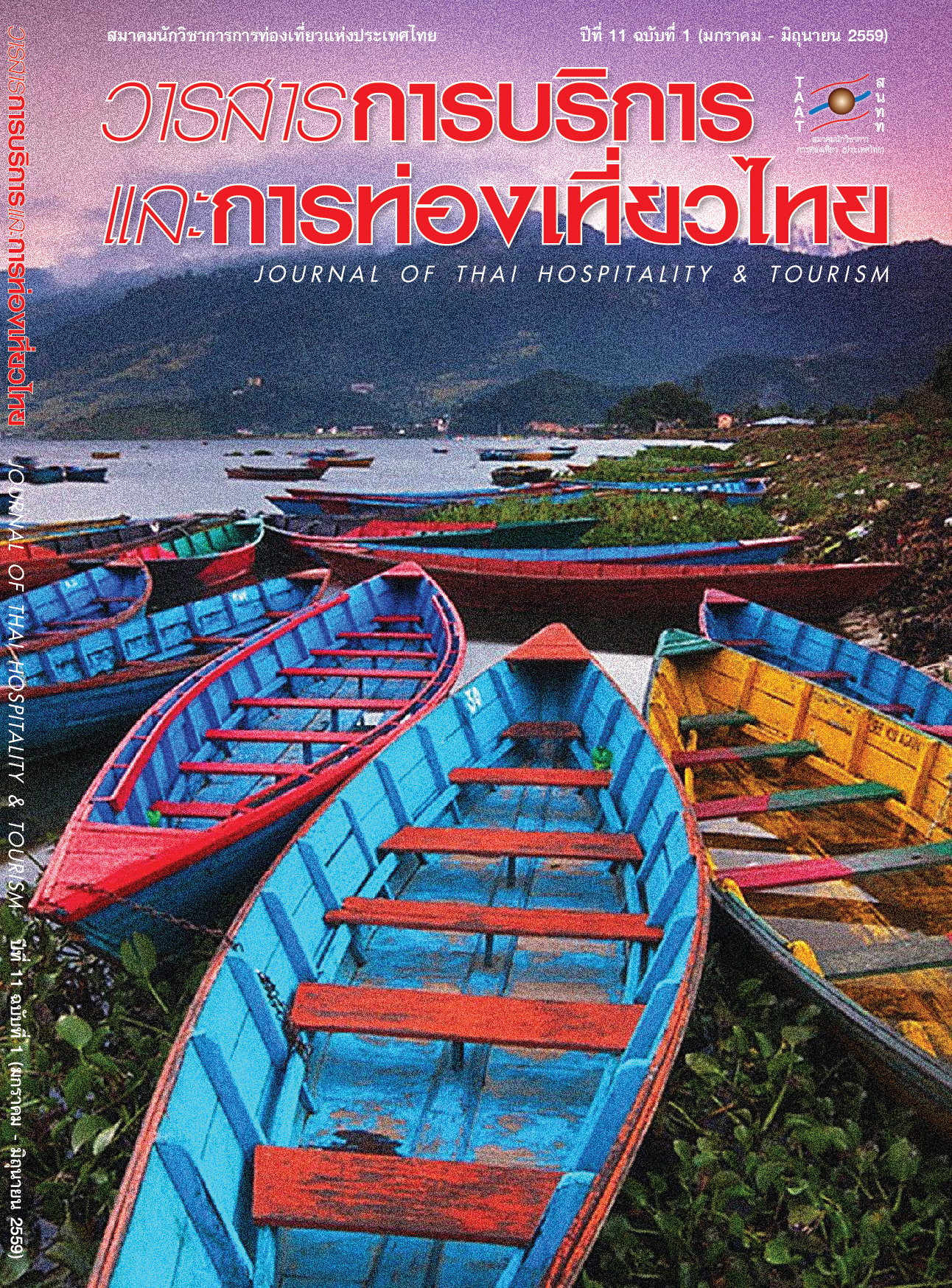Cultural Dimensions and Hotel Commentating via Online Travel Agent Websites of Thai and Other National Customers: Samui Island
Main Article Content
Abstract
This research aims to study opinions of Thai and other nation customers toward stayed hotels in Samui via online accommodation agent websites and to investigate the relation between the cultural dimensions of Hofstede and the comments. 3,267 comments were collected from 2 websites: agoda.com and booking.com. The finding revealed that hotel customers commented on positive issues rather than negative. In addition, hotel customers from all countries similarly expressed their negative opinions to guest rooms. The highest frequency of positive comments of Thai, ASEAN and Asia customers which is hotel’s physical evidence, are analogous. While most of non–Asia customers positively commented in hotel location issue. The research also found that cultural dimension–uncertainty avoidance is not related to customer satisfaction, positive and negative comments. While individualism and masculinity issues are related to customer satisfaction and positive comments. Lastly, the power distance dimension is related with customer satisfaction, positive and negative comments.
Article Details
References
[2] Akbaba, A. ( 2006). Measuring Service Quality in the Hotel Industry: A Study in a Business Hotel in Turkey. Tourism Management, Hospitality Management, 25, 170-192.
[3] Au, N., Law, R., & Buhalis, D. (2010). The Impact of Culture on E-Complaints: Evidence from Chinese Consumers in Hospitality Organizations. In Gretzel, U., Law, R., & Fuchs, M. (Eds). Information and Communication Technologies in Tourism 2010. (285–296) New York: Springer-Verlag.
[4] Burgess, S., Sllitto, C. Cox, C. & Buultjens, J. (2011). Trust Perceptions of Online Travel Information by Different Content Creators: Some Social and Legal Implications. Information Systems Frontiers, 13, 221-235.
[5] Buttle, F.A. (1998). Word of Mouth: Understanding and Managing Referral Marketing. Journal of Strategic Marketing, 6, 241-254.
[6] Choi, T.Y. & Chu, R. (2001). Determinants of Hotel Guests’ Satisfaction and Repeat Patronage in the Hong Kong Hotel Industry. Hospitality Management, 20, 277-297.
[7] Crotts, J.S. & Erdmann, R. (2000). Does National Culture Influence Consumers’ Evaluation of Travel Services? A Test of Hofstede’s Model of Cross-cultural Differences. Managing Service Quality, 10(6), 410-419.
[8] Department of Tourim. (2014). Situation of Tourists in Thailand during January to December 2013. Retrieved October 23, 2014 from https://tourism.go.th/index.php?mod=WebTourism&file=details&dID=7&cID =276&dcID=621.
[9] Field, A. (2009). Discovering Statistics Using SPSS. 3rd ed. London: SAGE.
[10] Foxman, E.R. & Raven, P.V. (1994). Response to Dissatisfaction: A Cross-cultural Comparison. Journal of Consumer Satisfaction, Dissatisfaction, and Complaining Behaviors, 7, 236-245.
[11] Foxman, E.R., Raven, P.V. & Stem, D.E. Jr. (1990). Locus of Control, Fatalism, and Responses to Dissatisfaction: a Pilot Study. Journal of Consumer Satisfaction, Dissatisfaction and Complaining Behaviors, 3, 21-28.
[12] Hofstede, Geert (1984). Culture’s Consequences: International Differences in Work-Related Values (2nd ed.). Beverly Hills CA: SAGE Publications
[13] In-Touch Research & Consultant. (2012). Studying the Market of ASAIN-Singapore Tourism. Bangkok: Tourism Authority of Thailand.
[14] Kasikorn Research Centre (2013). Tourism Industry and Business Related in Southern Part of Thailand. Retrieved December 20, 2014, from https://www.ksmecare.com/Article/82/29615/
[15] Litvin, S.W., Goldsmith, R.E. & Pan, B. (2006). Electronic Word of Mouth in Hospitality and Tourism Management. Tourism Management, 29 (3), 458–468.
[16] Manager Online. (2013). Bangkok – Phuket – Samui are Dream Destinations of World travels. Retrieved October 25, 2014, from https://www.manager.co.th/travel/viewnews.aspx? NewsID= 9560000061454.
[17] Mei, A.W.O., Dean, A.M. & White, C.J. (1999). Analyzing Service Quality in the Hospitality Industry. Managing Service Quality, 9(2), 136-143.
[18] Ngai, E.W.T., Heung, V.C.S., Wong, Y.H.,& Chan, F.K.Y. (2007). Consumer Complaint Behavior of Asians and Non-Asians about Hotel Service: An Empirical Services. European Journal of Marketing, 21 (11/12), 1375-1391.
[19] Ong, S. B. (2012). The Perceived Influence of User Reviews in the Hospitality Industry. Journal of Hospitality Marketing & Management, 21, 463-485.
[20] Peterson, R.A. & Merino, M.C. (2003). Consumer Information Search Behavior and the Internet. Psychology and Marketing, 20(2), 99-121.
[21] Poon, W.C. & Low, K.L.T (2005). Are Travelers Satisfied with Malaysian Hotels?. International Journal of Contemporary Hospitality Management, 17(3), 217-227.
[22] Saleh, F. & Ryan, C. (1991). Analyzing Service Quality in the Hospitality Industry Using the SERQUAL Model. The Service Industries Journal, 11(3), 324-343.
[23] Schall, M. (2003). Best Practices in the Assessment of Hotel-guest Attitudes. Cornell Hotel and Restaurant Administration Quarterly, 44(2), 51-65.
[24] Smith, D., Menon, S., & Sivakumar, K. (2005). Online Peers and Editorials Recommendations, Trusts, Choice in Virtual Markets. Journal of Interactive Marketing, 19(3), 15-37.
[25] Socialmediatoday.com (2013). What Content Travelers Seek Online. Retrieved December 23, 2014, from https://socialmediatoday.com/gonzogonzo/2086951/what-content-travelers-seek-online
[26] Stringam, B.B. & Gerdes., J.G. (2010). An Analysis of Word of Mo Ratings and Guest Comments of Online Hotel Distribution Sites. Journal of Hospitality Marketing & Management, 19, 773-796.
[27] Suwanvijit, W. (2014). Factors influencing Tourists’ Decision Making to Travel to Indonesia-Malaysia-Thailand Growth Triangle (IMT-GT) only Within Thailand area. Journal of Thai Hospitality and Tourism, 9(1), 18-33.
[28] The Hofstede Centre (2012). Country Comparison. Retrieved November 20, 2014, from https://geert-hofstede.com/
[29] Ureka Consulting Ltd.. (2012). Tourism Image of Thailand from International Tourists. Bangkok: Tourism Authority of Thailand.
[30] Ye, Q., Law, R., Gu, B.& Chen, W., (2011). The Influence of User-generated Content on Traveler Behavior: An Empirical Investigation on the Effects of E-Word-of-Mouth to Hotel Online Bookings. Computers in Human Behavior, 27, 634-639.

